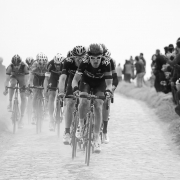INEOS 1:59 – A week on…
2019, so far, has been an incredible year of sport. The heroics of Ben Stokes in both the World Cup and Headingley Test. Huge comebacks in the Champions League knockout stages. Japan’s unexpected dominance in the pool stages of their home World Cup. And most recently, a weekend to remember in the marathon…Brigid Kosgei breaking the women’s record, taking a staggering 81 seconds off a 16 year record, and Eliud Kipchoge breaking the 2-hour marathon barrier.
I distinctly remember two years ago watching the Breaking2 attempt and being both amazed and upset about how close Kipchoge was to breaking 2 hours. It was incredible how much he actually knocked off the previous record, yet was only 1 second off the pace-per-mile to breaking 2 hours. However, this made the most recent attempt even more incredible. Kipchoge is relentless and with a goal in his sight he will never gave up. Almost uniquely, he is an athlete that is impossible not to like. A quiet man with a humble lifestyle and background, coupled with almost everything he says being a motivational quote makes him the ideal candidate for such a feat.
In life, the idea is to be happy. So, I believe in calm, simple, low-profile life. You live simple, you train hard and live an honest life. Then you are free.
Eliud Kipchoge
Following the record last weekend, a few things were thrown into controversy. The use of pacemakers, drafting and most notably: the shoes. Both Kipchoge and Kosgei were wearing models of Nike’s latest developments. Whilst Kosgei seemed to be wearing the commercially available Next% shoes (in accordance with IAAF rules), Kipchoge was wearing what Nike has called ‘A future version of Nike’s Next% marathon shoe’. The initial Vaporfly 4% were named due to the 4% improvement in running economy that they created on average. The Next% goes even further than this and Kipchoges mystery shoe, rumoured to be called alphaFLY, goes even further still. Some called the shoes a form of ‘Technical Doping’ giving athletes an unfair advantage due to the three individual carbon fibre plates and four individual cushioning pods to name just a few innovations each providing propulsion and economy to the runner’s stride.
For me, I have no problem with the development. In fact, I welcome it. Firstly as an unofficial record, the attempt is there to show that a sub-2-hour marathon is possible allowing other athletes to push to achieve and exceed this. Kipchoge said this himself: ‘I expect more people all over the world to run under two hours after today.’. Secondly, innovation in technology is a huge part of
The magnitude of this most recent record is huge. It sits alongside Roger Bannister’s 4 minute mile and the first sub-10 second 100m time recorded by Jim Hines with a time of 9.95 seconds. The interesting thing about both these records is that people once thought these barriers were unbreakable, and since then we’ve had Hicham El Guerrouj set a mile time of 3:43.13 and Bolt set a time of 9.58 seconds in the 100m – the barriers have been broken even further. Kipchoge’s record will be pushed further and hopefully in an official sense. I also hope Kipchoge takes the official record; he deserves it more than anyone right now, especially with his commitment and devotion to these unofficial records.
A lot has been said about the mindset of athletes like Kipchoge. Relentlessly devoted and focussed towards a goal. The mental aspect of performance is almost universally accepted as being a very important part, yet few people devote time to training their brain. Hopefully, as cognitive training comes more to the forefront of training, athletes will be able to reach higher heights than ever – pushing these records further than ever before. Evidence of the need for cognitive training in sports can be seen by the improvements in performance seen in studies where Brain Endurance Training is combined with regular training. Staiano et al., 2015 showed that those undergoing brain training at the same time as regular training had 3x the increase in performance in a time-to-exhaustion test over a 12-week period compared to a control group doing the same physical training without brain training. This shows that devotion to cognitive training is necessary if we want to push human performance to new levels and make the ‘impossible’ possible.
Thank you, Eliud, for showing us that #NoHumanIsLimited
I am the happiest man in the world to be the first human to run under two hours and I can tell people that no human is limited.
Eliud Kipchoge
Study Covered in Article for Further Reading
“A Randomized Controlled Trial of Brain Endurance Training (BET) to Reduce Fatigue During Endurance Exercise”
by Walter Staiano, Michele Merlini, Samuele M Marcora
Conference: ACSM Annual Meeting, 2015
Join Our Community!












